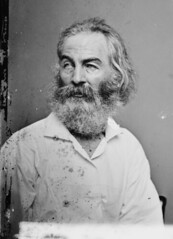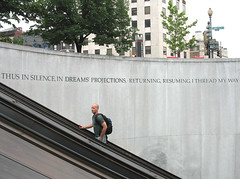by Matt Ringelstetter
 The next time you’re running up the escalator steps on the north side of Dupont Circle, slow down and take a moment to gaze upward along the stone entrance—just remember to stand on the right. A project to carve the last stanza to Walt Whitman’s poem, The Wound Dresser, was recently completed along the entrance to the station at 20th and Q st NW. Started earlier this summer, the inscription on the wall reads:
The next time you’re running up the escalator steps on the north side of Dupont Circle, slow down and take a moment to gaze upward along the stone entrance—just remember to stand on the right. A project to carve the last stanza to Walt Whitman’s poem, The Wound Dresser, was recently completed along the entrance to the station at 20th and Q st NW. Started earlier this summer, the inscription on the wall reads:
Thus in silence in dreams’ projections,
Returning, resuming, I thread my way through the hospitals;
The hurt and wounded I pacify with soothing hand,
I sit by the restless all dark night – some are so young;
Some suffer so much – I recall the experience sweet and sad…
 Taken from the section known as Drum Taps in his celebrated Leaves of Grass, the poem describes Whitman’s experiences as a nurse here in D.C. during the Civil War. Whitman’s connection to Washington runs deep, as he moved here in 1863 while searching for his brother George who had been wounded in the fighting near Fredericksburg, Virginia. The poet spent the next ten years of his life here in the District, working in hospitals and writing. He even fostered a passing relationship with President Lincoln. Passing by Whitman’s house during his daily commute to and from the White House, the two exchanged gtreetings. Recording his impressions of the President, Whitman wrote:
Taken from the section known as Drum Taps in his celebrated Leaves of Grass, the poem describes Whitman’s experiences as a nurse here in D.C. during the Civil War. Whitman’s connection to Washington runs deep, as he moved here in 1863 while searching for his brother George who had been wounded in the fighting near Fredericksburg, Virginia. The poet spent the next ten years of his life here in the District, working in hospitals and writing. He even fostered a passing relationship with President Lincoln. Passing by Whitman’s house during his daily commute to and from the White House, the two exchanged gtreetings. Recording his impressions of the President, Whitman wrote:
I see the President almost every day, as I happen to live where he passes to or from his lodgings out of town. He never sleeps at the White House during the hot season, but has quarters at a healthy location some three miles north of the city, the Soldier’s Home, a United States military establishment. I saw him this morning about 8:30, coming in to business, riding on Vermont Avenue, near L Street. He always has a company of twenty-five or thirty cavalry, with sabers drawn and held upright over their shoulders. They say this guard was against his personal wish, but he lets his counselors have their way…
I see very plainly Abraham Lincoln’s dark brown face, with the deep-cut lines, the eyes, always to me with a deep latent sadness in the expression. We have got so that we exchange bows, and very cordial ones. Sometimes the President goes and comes in an open barouche…
Sometimes one of his sons, a boy of ten or twelve, accompanies him, riding at his right on a pony. Earlier in the summer I occasionally saw the President and his wife, toward the latter part of the afternoon, out in a barouche, on a pleasure ride through the city. Mrs. Lincoln was dressed in complete black, with a long crape veil. The equipage is of the plainest kind, only two horses, and they nothing extra. They passed me once very close, and I saw the President fully, as they were moving slowly, and his look, though abstracted, happened to be directed steadily in my eye. He bowed and smiled, but far below his smile I noticed well the expression I have alluded to. None of the artists or pictures has caught the deep, though subtle and indirect, expression of this man’s face. There is something else there.
